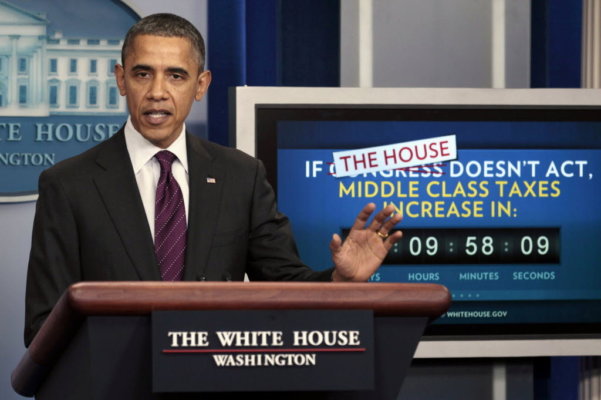From where I sit, last year was worse for the Republican Party and for progress than it ever was for President Obama. Yes, yes, I know what the conventional wisdom said about the president’s fifth year, but really, I don’t necessarily buy it. As a matter of fact, I think that when all is said and done by 2017, many people won’t even remember what the fuss was all about.
For example, the health care website was a dud in October and November, but as we speak, over 3 million people have signed up for health insurance through the portal and Medicaid, and the goal of signing up 7 million people by the end of March is eminently attainable. The Republican blahblahgosphere will say that not enough young, healthy people have signed up and that the death spiral will begin any time now, but since they’ve been wrong about everything related to the law (remember when the election of Scott Brown meant the end of the ACA?), why would we want to believe them now?
On immigration, the critics say that because there was no final bill last year that this was a failure for Obama. Not if we get a bill this year, and it’s looking more and more likely that we will. Not because it was a bad idea last year, but because the GOP has finally realized that they are national election toast of they don’t do something to help the Hispanic electorate that is running very quickly away from their party.
Likewise for the minimum wage, climate policy, appointees and foreign policy. In every one of these cases, the president won’t get Congress to sign on to his initiatives, but he’s laying the groundwork for later years or, most likely, for his successor who will most likely be a Democrat. At this point, Obama can do the most for this country by executive order and that’s what we’re likely to hear on Tuesday.
Most presidents, if they are remembered at all, are usually known for one or two major laws that transform the country. The ACA will be Obama’s main accomplishment, but I could see him also being remembered for the Consumer Protection Board and the president who saved the American automobile industry. Immigration would put him in the top ten lists of great ones. The right-wing knows this and that’s why their last-ditch efforts to derail anything Obama wants to do will be loud and scary. But that’s all they’ll be for years to come.
In the meantime, we are living through a trying time with a leader that history will remember fondly.
For more please go to:
www.facebook.com/WhereDemocracyLives and Twitter @rigrundfest
